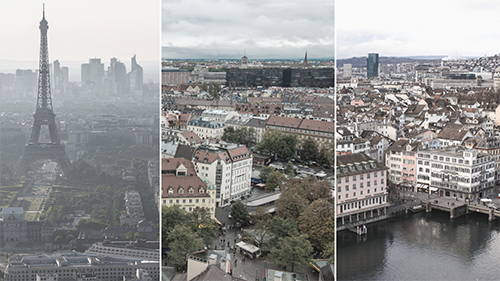
ICOS has been granted an EU funded project to develop a greenhouse gas measurement system for urban areas. The aim is to bring together and evaluate different measurement approaches, and determine fossil fuel related emissions from the rest of the carbon dioxide in the atmosphere. The 4-year project aims to develop tools and services for cities to execute their climate action plans.
The majority of word’s population lives in urban areas, and cities are therefore at the heart of emission reduction efforts globally. ICOS observations provide knowledge on greenhouse gases at continental and national scales in Europe, however, they do not provide enough detail at the much smaller urban scales. This will change now, since the European Commission has granted ICOS a Horizon 2020 project to create a concept for greenhouse gas observations in cities.
Many projects around the globe test and have tested different approaches to observe urban greenhouse gases, but so far these types of scientific measurements have not been performed systematically. The major scientific challenges relate to the application of technologies in urban areas, the integration of different observation technologies into one observatory, and to their use in verifying the emissions. The ICOS scientists are now set to solve these issues.
Network of 15 cities helps to develop fit-for-purpose services
To test the feasibility of different measurement approaches in different areas, three cities of different size have been selected as pilots: Paris, Munich and Zürich. To increase the impact and to make sure the concept developed will fit for different types of cities in different countries and landscapes, also 12 other cities – Helsinki, Copenhagen, Rotterdam, Antwerp, Krakow, Brno, Heidelberg, Basel, Porto, Barcelona, Rome and Athens, - are joining the city network.
The city network and its experts will allow the project to define and design fit-for-purpose services for cities, helping in their aims to reduce fossil fuel emissions and other climate actions.
The PAUL project connects to other European and global frameworks and initiatives
As other ICOS operations, the PAUL project (‘Pilot Application in Urban Landscapes – towards integrated city observatories for greenhouse gases’) aims to support the European Green Deal and the Paris Agreement. It is designed to fit in the context of the European Union’s Green CO2 Reports, that outline the additional needs to build a future anthropogenic CO₂ Emissions Monitoring & Verification Support (MVS) Capacity.
The PAUL project will work together with the variety of global research initiatives and projects that are actively working on the design and optimisation of observational networks in intense emission areas. The project will also connect closely to the IG3IS initiative of the World Meteorological Organisation that currently compiles good practise guidelines for urban greenhouse gas observations and to similar endeavours for air quality monitoring in cities.
The project will provide a concept for the long-term sustainability of greenhouse gas observations in urban areas.
More information:
Werner Kutsch, Director General of ICOS
Alex Vermeulen, Director, ICOS Carbon Portal
Katri Ahlgren, Head of Communications, ICOS